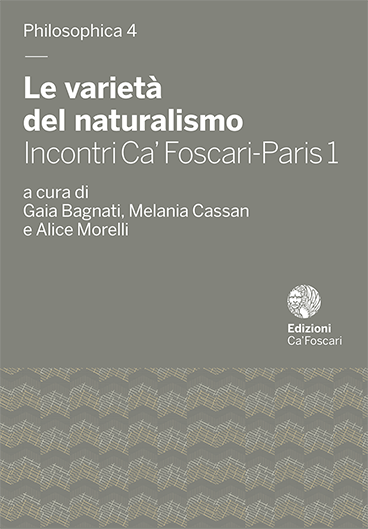
- search 1332 views
- file_download 762 download
- keyboard_capslockmetadata
-
mark_email_readIscriviti alla newsletter
Le varietà del naturalismo
Incontri Ca’ Foscari-Paris 1
edited by
abstract
‘Naturalism’ is a category that applies to different philosophical perspectives sharing the idea that nature is the primary object of philosophical enquiry. However, the philosophical debate of the second half of the twentieth century, mainly within analytical philosophy, has led towards an identification of naturalism with the sole scientific naturalism. The volume contains the proceedings of a doctoral workshop, in which PhD students and professors of Ca’ Foscari University of Venice and Université Paris 1 Panthéon-Sorbonne critically discussed this tendency. The contributions present some versions of naturalism, from ancient to contemporary philosophy, with the aim of showing how a naturalistic approach, together with some notions it implies (i.e. nature, habits, disposition, behaviour), may constitute valid categories of interpretation of reality out of a scientist paradigm.
-
Keywords keyboard_arrow_down
Language and cognition • Nick Enfield • Self • Will • Naturalism • Political epistemology • Consciousness • Nicomachean Ethics • Human sociality • Ontological naturalism • Medieval philosophy • Cosmopolitanism • Soul and body unity • Habits • Second philosophy • Scepticism • Physical pains • Fear • Human nature • Cartesianism • Personal identity • Change • Nature • Continuism • David Hume • Diogenes of Oinoanda • Dualism • Ethics • Spinoza • Naturalization • Political philosophy • Sou • Mind • Epistemological naturalism • Metaphilosophy • Uni-directionality • Justice • Seneca • Aristotle • Stoicism • Past • Disposition • God • Laws • nurture • Citizen of the world • Theory of knowledge • Epicureanism • Language • Sensible affections • Virtue • Wittgenstein • Dewey • Emergentism • Method • Nature vs • Culture and mind
Table of contents
- search 285 view
- file_download 15 download
- search 485 view
- file_download 26 download
- search 476 view
- file_download 37 download
- search 289 view
- file_download 9 download
- search 324 view
- file_download 33 download
- search 508 view
- file_download 31 download
- search 466 view
- file_download 24 download
- search 337 view
- file_download 16 download
- search 363 view
- file_download 16 download
- search 338 view
- file_download 13 download
- search 420 view
- file_download 31 download
- search 593 view
- file_download 45 download
- search 386 view
- file_download 24 download